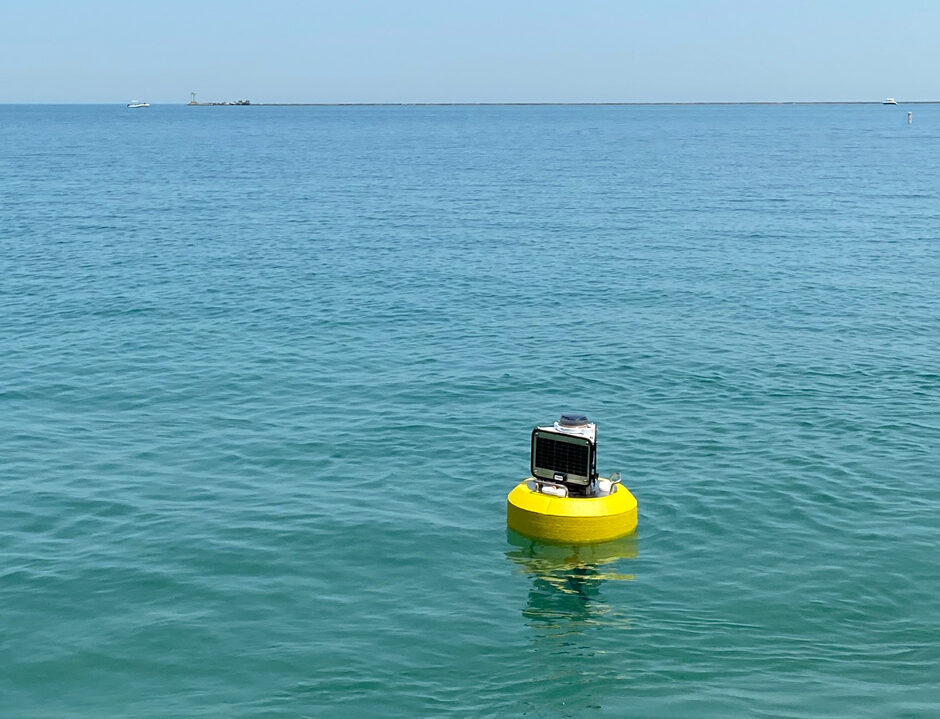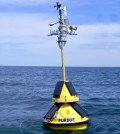Posts for tag "Lake Michigan"
Protecting Chicago’s Lakefront: Freshwater Beach Monitoring
Thousands of people flock to the Great Lakes every year to enjoy the freshwater beaches along the coast. As an urban hub with over 2.5 million residents, beachfronts in Chicago have regular visitors as well as tourists...
- Posted November 6, 2023
Diatoms Dominate Muskegon Lake In A Cold And Rainy Year
An unusually rainy and cold year changed the phytoplankton makeup of one Michigan lake. Climate change makes similar changes more likely in the future.
- Posted October 15, 2021
Lake Michigan’s Smarter, Streamlined Buoys
New, smarter buoys were deployed on Lake Michigan this summer, so EM spoke to an engineer who helped design them and a scientist using their data.
- Posted November 5, 2018
Great Lakes Meteotsunami Experts Hone in on Big Wave Forecasts
Meteotsunamis are big waves that have been historically mislabeled and poorly forecasted in the Great Lakes. Experts are learning more and predictive tools are in sight.
- Posted July 2, 2018
US Steel Dumping Chromium: Citizens Fighting for Lake Michigan, and Drinkable Water
Surfers and other beach users in Indiana are pursuing a lawsuit, hoping to make US Steel follow the regulations for chromium dumping in Lake Michigan.
- Posted March 16, 2018
Citizen Scientists Helping Protect Water Quality and Measure Impact of Climate Change
Citizen science matters: these two Michigan projects illustrate the importance of citizen science in the realm of water quality and climate change research.
- Posted February 14, 2018
Geospatial Database Launches For Great Lakes Region
Scientists at the University of Michigan have led the development of the Great Lakes Aquatic Habitat Framework, GLAHF, an impressive geospatial database.
- Posted November 17, 2016
On Way To Beaver Island, Ferry Logs Lake Michigan Data
Aboard a Beaver Island ferry, Central Michigan University scientists have installed a sampler and multiparameter sonde to study water quality.
- Posted August 2, 2016
Lake Michigan Water Levels Surge Feet Over Past Few Years
Folks living along the Lake Michigan shoreline have been witnessing a big rebound in its water levels since 2013, according to the Milwaukee Journal – Sentinel. The level of the lake has surged by about 4 feet....
- Posted May 26, 2016
Beach Buoy Data Puts E. Coli Modeling Through Paces
Results of a long-term E. Coli modeling effort backed by Chicago beach buoy data show a predictive modeling approach is better than traditional methods.
- Posted May 13, 2016
Grand Valley State Vessel Aids Water Quality Research
The Grand Valley State University research vessel D. J. Angus has supported many visitors over the years, according to the Michigan State University Extension. Among them has been educators, students and members of the general public looking...
- Posted December 11, 2015
New Lake Michigan Buoy To Provide Nearshore Info To Beachgoers, Scientists
Illinois-Indiana Sea Grant and LimnoTech team up to launch a new data buoy in Lake Michigan that will aid Chicago beachgoers and Great Lakes researchers.
- Posted September 11, 2015
Models show rising temperatures could upend Lake Michigan Basin’s climate
As global temperatures rise, the Lake Michigan Basin could see a host of changes in its seasonal climate, according to new models by the USGS
- Posted December 9, 2014















